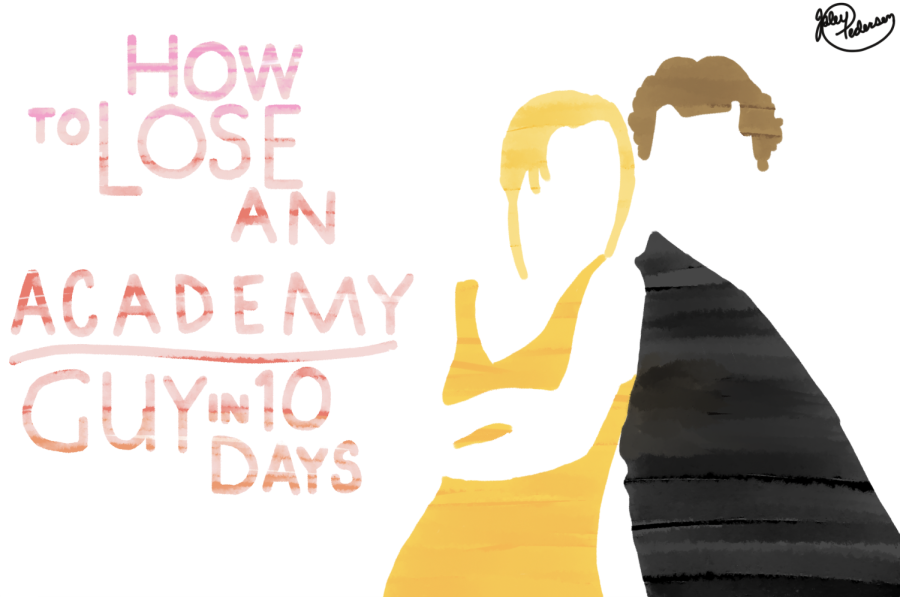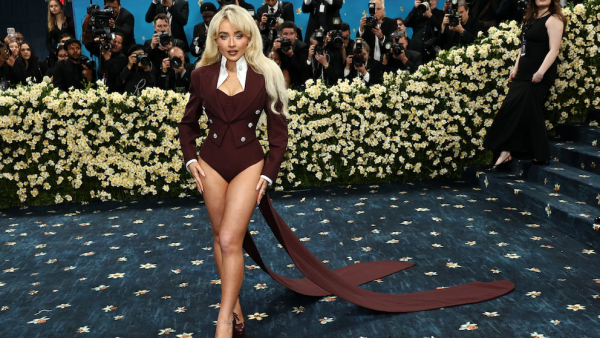How to Lose an Academy Guy in 10 Days
Sophia Liem ’23 gives her take on rom coms.
How do you lose an Academy guy in ten days? The typical Academy guy likes sporty girls. So, if you really wanna lose him fast, stop wearing Lululemon! Another thing is to remember to walk slowly. Academy guys are typically in a rush if they have to walk to the many buildings on our campus, so not being able to keep up with their busy schedule will likely upset them. Finally, dress out of theme at football games! If you aren’t a true fan, forget about getting a man.
See what I did there? I think most can realize that telling women how to act in order to keep, or even lose, a man is at least a slight problem. However, it happens to be the exact message behind nearly any rom-com—and most obviously in the classic movie, How to Lose a Guy in 10 Days. The story follows Andy and Ben played by Kate Hudson and Matthew McConaughey, each with different professional goals. As a writer at a magazine, Andy takes on a crazy story about—you guessed it— losing a guy in ten days. On the other hand, Ben, who is in marketing, decides to make a woman fall in love with him in ten days in order to prove to his boss that he understands women well enough to market diamonds to them. Unfortunately for them, they get paired up without the knowledge of each other’s goals in the relationship. Of course, as the hilarious story progresses, they fall in love, have a short-sighted misunderstanding when they find out about each other’s projects, but still create a heartfelt story where they live happily ever after in the end. It’s a personal favorite of mine and has become a legend in the world of rom-coms. However, when taking a closer look, a more problematic message becomes clear.
While I know How to Lose a Guy in 10 Days is a funny heartfelt love story, it, and other rom-coms implicitly promote gender stereotypes. For example, Andy takes an overly feminine persona in order to lose Ben quickly—she does things that seem stereotypical like installing a pink fluffy toilet seat in his bathroom or being extremely emotional during a meal. This reinforces the idea that in order for a man to like a woman, she has to transform into the sports fanatic rather than the emotional, sundress-loving, girly girl. In other words, she has to be different—announcing to women that they need to alter themselves to fit into a mold of attractive femininity. This can even be a problem for the male point of view by reinforcing the idea that men cannot give in to femininity if they want to stay an attractive, cool protagonist like Ben. These stereotypes, while not always false, still promote the ideal gender roles that should be taken in order to be in a successful relationship.
While yes, I’m aware that this is one specific movie, and might not be a complete representation of Hollywood’s interpretation of gender roles, it seems to be a common theme amongst most rom-coms. The female protagonist is usually quirky or different from other girls while the heartthrob male becomes infatuated with her rejection of femininity. I’m sure this is a reality for plenty of girls, but when it appears as such a common theme in an industry that is so heavily marketed towards women, I begin to question whether it’s something we should always accept.
The idea that women need to reject femininity in order to be desirable for men becomes a problem when it makes us reject ourselves. To be completely honest, the idea that women don’t always need to be feminine is not problematic. However, it gets to be unsettling when the sole purpose of that idea is determining our relationship status. Andy is a cool, sport-loving, beautiful woman who happens to be extremely accomplished with a masters degree from Columbia. However, when she finally branches off and tries to write important articles about politics or poverty, Ben swoops in and stops her so they can live happily ever after. Andy chooses a man she met ten days ago over her dream of reporting, signaling to the audience that it’s her differentness rather than academic accomplishments that make her a protagonist—otherwise, how would she get the man? Although this is a valid decision for any woman, the theme that women don’t end up in the professional world is over-represented in romcoms. When it gets to be so common, we come into professional spaces with an ingrained problematic understanding: “success is defined by our relationships, not professions.”
From one perspective, How to Lose a Guy in 10 Days is a comforting tear-jerker for Kate Hudson fans. However, a closer look at its messaging reveals the very consistent trend in the way women in relationships are presented under Hollywood’s spotlight. It’s an issue that persists in many of the great rom-coms: Pretty Woman, Runaway Bride, 27 Dresses, etc. Ladies, while I know you might not think about it, don’t ever let the glam and dreamy romance of Hollywood prevent you from dressing out of theme at football games or walking slowly around campus. Whether we’re playing football with “the boys” or taking the time to glue on those false lashes, Academy guys shouldn’t care and neither should we.

Writing for the Advocate since junior year, and now the Diversity, Equity, and Inclusion Coordinator, Sophia is drawn to articles that she is passionate...

Haley ‘25 is the Advocate’s Graphic Art Editor. Their overall artist career sprouted at a young age from their various dragon sketches and drawings,...













Helena • Nov 4, 2022 at 6:27 pm
YESSSS. I love being a woman and I love men. I will not compromise on my amazing womanness